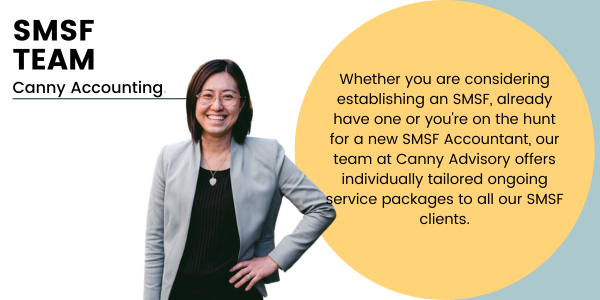Investing With Your SMSF: What Are The Rules?
Written by: Accounting Team
While the world of investments might not be for everyone, whether you are an investing novice, an investment aficionado (or anywhere in between), all self-managed superannuation funds (SMSFs) are required to follow specific rules and requirements in their investing activities.
The nitty-gritty of investing is one of many reasons why some people seek to manage their own superannuation. A self-managed superannuation fund can provide choice and control to their members, as they are also the Trustee’s making the decisions.
I like to think of this as the fun part to having an SMSF, depending on your definition of fun (and I am an Accountant after all)!
Investing With Your SMSF – Rules + Regulations
As a Trustee of an SMSF, where do you even start? The complexity includes (but is not limited to) the following considerations:
- The Trustees are responsible for making all investment decisions, they cannot pass or defer this responsibility onto another.
- While Trustees are responsible for all investment decisions, do they need to consider obtaining investment advice from a licensed Financial Adviser? If so, they will also need to decide whether to proceed or not to proceed with the recommendations.
- The Trustees must consider the investment risk, and how these risks align to the members situation and outcomes.
- Trustees must follow the superannuation rules.
To get a bit dry here, legislation that governs the superannuation industry is the Superannuation Industry (Supervision) Act 1993, often referred to as the SIS Act. While it does not cover all applicable rules and laws the super industry must follow (other Acts, such as the Income Tax Assessment Act 1936 & 1997 apply), it is often what is being referenced when “super laws” is mentioned.
Before any investment actions are undertaken the SIS Act must be considered first, as well as the SMSF Trust Deed as a close second.
While the SMSF Trust Deed sets the specific rules of the fund, it cannot override rules the SIS Act specifically prohibits. It can, however, potentially restrict allowable actions under the SIS Act. This can be through intentional rules in the trust deed, by a lack of clarity in the wording of rules or an absence of specific rules.
Coming in third is the SMSF Investment Strategy. Trustees must have a written investment strategy in place for the SMSF, which is required to be reviewed regularly. The strategy sets the plan for investment decisions consistent with the investment objectives and retirement goals of the members.
To understand how the three interact to determine what you can and cannot do in the SMSF (and how they support or contradict each other), we will look at an example of Limited Resource Borrowing Arrangements (LRBA), and this is but one example of many options investing with your SMSF.
| SIS Act | The SIS Act specifically prohibits Trustees of SMSFs borrowing money, subject to limited exceptions. One such exception is using an LRBA to fund the purchase of ‘single acquirable asset’ |
| SMSF Trust Deed | While the SIS Act does not prohibit the acquisition of a ‘single acquirable asset’ under a LRBA, does the SMSF Trust Deed (also known as the governing rules) allow the Trustees of the fund to borrow money? It may not. |
| SMSF Investment Strategy | Is borrowing consistent with the investment strategy of the fund? Can it meet future obligations for loan repayments? Does the risk align with the member’s best interest and goals? |
Looking to understand more about your SMSF? We’ve got another article explaining how and why your SMSF can borrow money for purchasing assets! Can Self-Managed Super Funds Borrow?
Financial Goals: Why Do The Rules Matter?
Every year, the SMSF is reviewed by an independent auditor to confirm compliance with these rules and the ATO must be notified if breaches have occurred.
Penalties can be significant, including mandatory Trustee education, monetary fines, disqualification as Trustee, prosecution and even jail time. The considerations and rules for investing through superannuation and SMSFs often come as a surprise to many, why the increased compliance?
It comes down to purpose.
The Sole Purpose Test
Wait, no one mentioned tests – are they at least multiple choice?!
We must be careful not to oversimplify the super industry under the umbrella of the wider banking and finance industry. Superannuation fundamentally differs in nature to other related industries. If we get comfortable with a little ‘light’ reading, Section 62 of the SIS Act refers to the Sole Purpose Test, which specifically outlines the core purpose(s) of maintaining a regulated superannuation fund. All superannuation Trustees must make decisions in accordance with the Sole Purpose Test.
Overall, the purpose of superannuation is to support members’ incomes in retirement and/or the provision of death benefits. Simple enough, yet more nuanced than expected. Section 62 of the SIS Act exists as part of a heavily regulated industry. It requires funds (and their Trustees) to act in the best interest of their members. They must do so to contribute to outcomes that will be delivered to members, as opposed to delivering outcomes for personal gain or profit.
“But Brittany, how is this any different to companies acting in the best interests of their shareholders? Both are focused on profits and investment returns for their ‘members’ or ‘shareholders'”.
Excellent point, but what is their purpose to this focus? You may feel like we are splitting hairs here, so let’s pause a moment and consider this:
Are there any other industries where you:
- Are mandated to deposit a portion of your salary package or entitlements;
- a minimum of 11.5% for the 2025 financial year onwards.
- Into an account to provide retirement and/or death benefits
- Of which you may not have immediate access
- Until age 65, or unless an earlier condition is met (of which very few exist)
- And for most Australians, managed by a third party (a fund).
Companies are focused in generating returns for their shareholders, a defined group of investors and shareholders. Yet this group are not mandated to be shareholders of the company and in come cases, have voting powers on the actions of the company. By comparison, not only are the greatest stakeholders of superannuation funds their members (around 17 million Australians), but the Government is also a major stakeholder of the overall success of the super industry.
As our population ages, more pressure is placed on providing age, pension, medical and other supports for retirees and seniors. Government looks to superannuation to support the increasing pressure on the provision of social security and welfare supports.
Canny Advisory, Assisting + Guiding Your Self-Managed Superannuation Fund (SMSF)
Ultimately, this humble blog is a drop in the SMSF investment ocean of rules and regulations.
Many SMSFs we assist have SMSF Trustee investment responsibilities well in hand, whether that be solo or with the support of an adviser. Unfortunately, there are SMSFs we begin assisting where Trustees have taken an unintentional misstep and found themselves at risk of a compliance breach. It is never too early or too late to ask for help from SMSF specialist Accountants and Financial Advisers, and Canny is here for you.
Get in touch to talk about your Self-Managed Super Fund plans!





